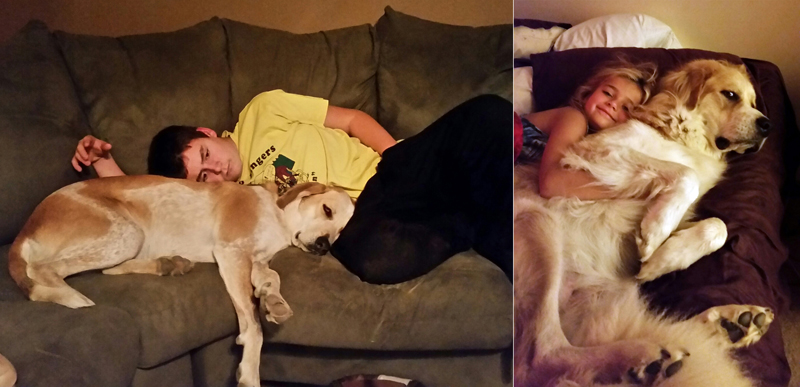
From left: Luna with Nicole Sciascia’s son, Christian Snape, and Caspian with her daughter, Franky Sciascia. A rabid skunk attacked the dogs inside an enclosure at their Whitefield home Monday, Dec. 4. (Photos courtesy Nicole Sciascia)
A rabid skunk attacked two dogs inside a fenced-in area and attempted to enter a house on Hilton Road in Whitefield late Monday, Dec. 4, but the homeowner shot and killed it in her dooryard.
Nicole Sciascia has two dogs: Caspian, 3, a Great Pyrenees mountain dog, and Luna, 1 1/2, a blue tick coonhound-Great Pyrenees mix. The dogs were in the enclosure around 10 p.m. Monday when a skunk sprayed them from the other side of the fence.
Sciascia heard the hound start to bark and howl, and ran to the front porch. She saw the skunk and went inside to get her .380-caliber pistol. When she went back outside, the skunk was in the driveway going toward the road.
Sciascia went inside again to change her clothes and get the bathroom ready to bathe the dogs.
After about 10 minutes, she went to the back door, where the dogs enter and exit the enclosure through a doggie door. The skunk was chasing the dogs, which weigh 100-plus pounds each, around the enclosure and trying to get in the doggie door.
Sciascia managed to get the “terrified” dogs inside and secure them in a room upstairs.
Sciascia then went outside with her pistol, where the skunk was running around at random, “like a chicken with its head cut off,” she said. She shot and killed the skunk just feet from the front door.
“I shot it right in front of the doorway,” she said. “I didn’t really have a choice. It was right there and it wasn’t giving up.”
She later took the skunk’s carcass to the Maine Health and Environmental Testing Laboratory in Augusta, where the skunk tested positive for rabies Tuesday, Dec. 5. An employee of the laboratory confirmed the positive test.
The dogs do not have any visible bites or scratches, according to Sciascia. One dog was up to date on its shots while the other was a few weeks past due, but both have since received booster shots.
The vet advised Sciascia to monitor the dogs for symptoms for 45 days and encouraged her to share the story of the attack.
Sciascia doesn’t know whether the skunk dug a hole under the fence or scaled the fence to get into the enclosure. She hopes her story will help other pet owners avoid the “false sense of security” she had with her dogs inside the fence.
The Health and Environmental Testing Laboratory has confirmed two other cases of rabies in Lincoln County this year, in a raccoon from Bremen tested June 26 and a skunk from Waldoboro tested Dec. 1.
The Waldoboro skunk killed a domestic duck and injured at least one other, according to the lab employee. The skunk arrived at the lab with porcupine quills in it. Quills are a strong indicator of rabies, as a healthy skunk would be unlikely to attack a porcupine.
In 2016, there were four cases in the county: a skunk in Waldoboro on Feb. 1, a skunk in Whitefield on Aug. 8, a cow in Whitefield on Aug. 31, and a skunk in Jefferson on Sept. 27, according to the laboratory.
Rabies is spread when a rabid animal bites or scratches a person or animal, or when a rabid animal’s saliva or neural tissue comes into contact with a person or animal’s mouth, nose, or eyes, or enters a cut in the skin, according to the Maine Division of Infectious Disease. Rabies affects the brain and spinal cord and can cause death if left untreated.
The Lincoln County Sheriff’s Office advises residents to vaccinate their domestic animals and, in the event of an encounter with a potentially rabid animal, to call 911 and stay away from the animal, according to Lt. Michael J. Murphy.
For more information about rabies prevention, see the federal Centers for Disease Control and Prevention website at cdc.gov/rabies or the Maine Division of Infectious Disease website at goo.gl/91ZiVD.



